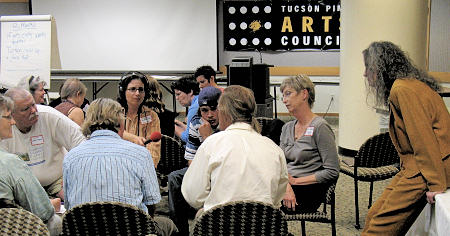
Last night I had the privilege of facilitating a community conversation on behalf of the Tucson Pima Arts Council.
Not surprisingly, the conversation was prompted by the economy. Such discussions typically revolve around issues such as collaboration – sharing resources for HR or fundraising or co-locating. Talk often then turns to advocacy – making the group’s case to local funding authorities, to ensure their piece of that ever-shrinking pie is secure.
Tucson’s arts groups received none of that.
“How many of you don’t already either collaborate, share resources, or know you should?” Nods of recognition. “You don’t need a Community Conversation for that. But here’s what you do need. You need to know that while the economy is truly wretched, you can choose right now what you want to do about it.”
Then I told the group this:
You can continue to bemoan and hope and react. You can continue to be whipsawed by circumstances. You can continue to be the victim.
Or you can claim Tucson’s Arts Community’s rightful place as the source of our city’s creativity and innovation.
You can become our community’s leaders.
As victims, groups gather together from fear. They hunker down, closing ranks, trying to figure out how each of their individual organizations can survive.
As leaders, groups gather together in strength. They spread their arms wide around each others’ shoulders, working to build upon their collective capacity to make their community a vibrant, healthy place to live.
As victims, we are always longing for – perhaps even demanding – a place at someone else’s table.
As leaders, we define the table, we build the table, we populate the table, and we engage others to join us at that table. The best leaders build huge tables, inviting and engaging everyone to partake of an abundant bounty.
As victims, we define our value by what others value – the oft-quoted “economic value of the arts” as just one example.
As leaders, we are honest about the real value of our work (for the arts that might be the spiritual, intellectual and mental/emotional well-being that are the life-affirming and health-making value of the arts). Such an affirming statement was made loud and clear last night by Bob Booker, ED of Arizona’s Commission on the Arts, as he announced that Social Services would be one area the state would continue to fund. “When people are in crisis, they need the arts even more.”
As leaders, we can be the change we want to see in our communities. We can imagine the future we want to create, and create it together.
And that is precisely how the group spent the rest of the brief evening – envisioning what Tucson could be like in the next 12 months if the whole arts community worked together.
That is when magic happened. As we asked our community’s creative force to imagine what was possible, 60 artists came alive. 60 artists found their strength and their voice. 60 artists found that their potential and their strength are their collective capacity to indeed be our community’s source of creativity.
And if ever there were a time our community needed creativity and innovation, it is now.
After that hour together, the group took the best action we could hope for in such a brief time: they set a date to keep the conversation going, to move forward, to be the change they want to see.
They may have entered that room as victims of our economy (and our social biases). But last night, 60 artists left that room as leaders in our community’s future.
As you head out to do your own work in the community you serve, that is what I wish for you. Start a different conversation. Ask the question: Will we be victims or leaders? And then let’s begin creating the future we all want for our world.
What happened at this meeting is not rare. You can create the same conversation in your community. Learn more in The Pollyanna Principles (complete with case studies!).
